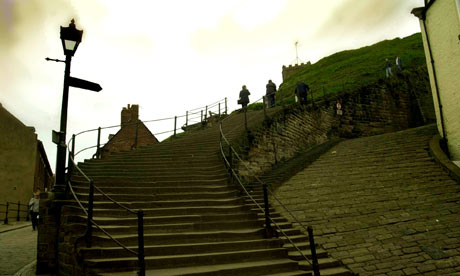
If any place in Britain deserves the as-yet-uncreated accolade of Unesco Halloween Town, I would argue that the honour should go to Whitby.
This pretty former fishing village on the North Yorkshire coast nestles in some of the most dramatic coastline to be found anywhere in these isles, and has earned a permanent place in the literary hall of fame as the place where Count Dracula first sets foot on English soil in Bram Stoker's 1897 novel.
Unlike Cologny, the birthplace of Dracula's spiritual cousin Frankenstein's monster, which Sam Jordison found rather lacking in whatever had informed Mary Shelley's creation, Whitby continues to exude the atmosphere that so entranced Stoker when he spent the summer of 1890 there, prior to writing his masterpiece.
The vampiric nobleman is carried to Whitby aboard the ill-fated Russian schooner the Demeter, which lurches into port all but abandoned, save for the grisly spectacle of the skipper's corpse lashed to the wheel. Upon investigation by the townsfolk, the ship gives up its secret: an immense black dog – Dracula in fiendish form – leaps from the hold and makes for the safety of the churchyard that sprawls around the Gothic pile of the ruined Abbey on the East Cliff overlooking the harbour. Thus are Whitby and one of the horror genre's founding principals utterly entwined.
In the 112 years since the publication of Dracula, Whitby has settled rather comfortably into its role as Britain's premier spooky location. The Abbey looks down dolefully from its vantage point on the cliff, while the warren of narrow streets that wind down to the sea are pregnant with the promise of phantoms and skittering shapes, especially at dusk. The brash amusement arcades, seaside tat shops and fairground rides on the way down to the beach provide a hectic counterpoint to Whitby's dark heritage; but even amid the slot machines and fish and chip shops you'll find the Dracula Experience, rendering Stoker's novel down to a quick thrill-fix in the dark.
Of course, not everyone in Whitby relishes the relationship between the town and the macabre. When I last holidayed there in July this year, there was a letter in the local newspaper, the Whitby Gazette, on the topic of the suggested cancellation of a horror film festival planned for Whitby (which did subsequently go ahead). "Do we really want to encourage the atmosphere of blood-sucking, weird behaviour and murder and torture that are a large part of most horror films (including Dracula) in our town?" bemoaned the correspondent, adding: "We have shipbuilding, exploration, early railway history, alum and iron mining, the Abbey, St Hilda, the Synod of Whitby, Captain Cook, smuggling, early man on the moors and lots more. This is what Whitby and the surrounding area is about, not horror films."
Does location inform literature, or is it the other way around? Dracula, it might be argued, has made Whitby famous beyond the catchment area of those who would normally holiday in a town that has, admittedly, much more going for it than merely vampires. But something captivated Stoker enough to make the place almost a character in its own right in Dracula, and has done the same to other writers as well. A contemporary of Stoker's and a regular visitor to the area was Violet Hunt, a writer and socialite who published two collections of ghost stories. Lewis Carroll stayed there in 1854, and there is speculation that his visits may have informed his writing of Alice's Adventures in Wonderland. Wilkie Collins stayed at the Royal Hotel in 1861 and the following year published his follow-up to his ghost story The Woman In White, No Name, which includes scenes set locally.
More recently, the writer Paul Magrs has mined the culture of horror fiction for his superb series set in Whitby and featuring the amateur sleuths Brenda and Effie – a kind of Hammer Horror Rosemary and Thyme. Magrs himself wrote: "In my Brenda and Effie Mystery books there is something at the heart of Whitby that works on the imagination of its inhabitants and creates real magic. And I think that is true in real life, too – in the effect that the place has on people who visit there."
It's the same something that attracts Britain's Goths to Whitby twice a year for their festivals (there's one beginning today). But it seems to me that the town has transcended its links with Stoker to emerge as one of the few places remaining in Britain today with genuine, palpable atmosphere. If you're at a loose end this weekend, you could do far, far worse than treat yourself to some of the innate spookiness that is as much a part of the psychogeography of Whitby as are the fossils that physically abound in its coastal cliffs.

